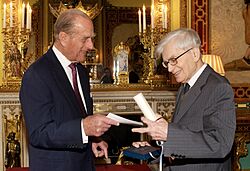Bernard d'Espagnat facts for kids
Quick facts for kids
Bernard d'Espagnat
|
|
|---|---|

Bernard d'Espagnat receiving the Templeton Prize from the Duke of Edinburgh, Buckingham Palace in 2009.
|
|
| Born | 22 August 1921 Fourmagnac, Midi-Pyrénées, France
|
| Died | 1 August 2015 (aged 93) Paris, France
|
| Nationality | French |
| Alma mater | Sorbonne |
| Awards | Templeton Prize (2009) |
| Scientific career | |
| Fields | Physics |
| Institutions | Sorbonne |
| Doctoral advisor | Louis de Broglie |
| Doctoral students | Mary K. Gaillard |
Bernard d'Espagnat (born August 22, 1921 – died August 1, 2015) was a French theoretical physicist and philosopher of science. He was well-known for his ideas about the true nature of reality. The Wigner-d'Espagnat inequality is partly named after him.
Contents
Early Life of Bernard d'Espagnat
Bernard d'Espagnat was born on August 22, 1921, in Fourmagnac, France. He spent most of his childhood in Paris. His father was a painter, and his parents taught him to love classic books and art.
While in school in Paris, he was very interested in humanities, especially philosophy. Even with this interest, d'Espagnat chose to focus on science and math. He believed that new ideas in philosophy would need a strong understanding of modern science. In 1939, World War II started, which put his plans for higher education on hold.
Education and Career in Physics
Bernard d'Espagnat earned his Ph.D. from the Sorbonne. His main teacher was Louis de Broglie, a famous physicist. From 1947 to 1957, d'Espagnat worked as a researcher at the Centre National de Recherche Scientifique (CNRS).
During this time, he also worked with other important scientists. He worked with Enrico Fermi in Chicago from 1951 to 1952. He also joined a research project led by Niels Bohr in Copenhagen from 1953 to 1954. After that, he became the first theoretical physicist at CERN in Geneva, working there from 1954 to 1959. CERN is a large European organization for nuclear research.
From 1959 until he retired in 1987, d'Espagnat was a senior lecturer at the Sorbonne University. He also directed the Laboratory of Theoretical Physics and Elementary Particles at the University of Paris XI (Orsay) from 1980 to 1987. He was a visiting professor at the University of Texas at Austin in 1977. Later, he visited the University of California - Santa Barbara in 1984.
He became a member of the Brussels International Academy of the Philosophy of Science in 1975. In 1996, he joined the French Academy of Moral and Political Sciences. His work on Bell's inequalities and his idea of "veiled reality" gained attention. In 2009, he won the Templeton Prize. He received this award for his work that showed science cannot fully explain "the nature of being."
Philosophical Ideas on Reality
Bernard d'Espagnat was concerned that many physicists did not pay enough attention to the deep questions raised by quantum mechanics. Quantum mechanics is a branch of physics that studies very tiny particles. His first book, Conceptions of Contemporary Physics (1965), explored these questions. He believed scientists should think about the big ideas that came from their own research.
D'Espagnat was one of the first to explain the philosophical importance of quantum physics experiments. In his 1979 article, "The Quantum Theory and Reality," and his book, In Search of Reality, the Outlook of a Physicist, he encouraged people to think differently about reality. These ideas are now important for new research fields about the nature of reality.
Veiled Reality Concept
In his book Veiled Reality, An Analysis of Present-Day Quantum Mechanical Concepts, d'Espagnat created the term "veiled reality." He explained that even with new experiments, we still cannot fully understand reality in a simple, clear way. It's like reality has a "veil" over it that we can't completely lift.
His book On Physics and Philosophy (2002) was praised as a very complete book on the topic. His last book, Candide and the Physicist (2008), was written for everyone. It answered 50 questions about modern physics and how our ideas about the world have changed.
D'Espagnat believed in something called "transcendental realism." This idea suggests that there is a reality that exists independently of us, even if we can't fully grasp it with our senses or science. He even suggested that this idea could offer a new argument for the existence of God.
Books by Bernard d'Espagnat
- 1965 - Conceptions de la physique contemporaine (Conceptions of Contemporary Physics)
- 1979 - À la recherche du réel - Le regard d'un physicien (In Search of Reality, the Outlook of a Physicist)
- 1994 - Le Réel voilé, analyse des concepts quantiques (Veiled Reality: An Analysis of Quantum Mechanical Concepts)
- 2006 - On Physics and Philosophy
- 2008 - Candide et le physicien (Candide and the Physicist)
See also
 In Spanish: Bernard d'Espagnat para niños
In Spanish: Bernard d'Espagnat para niños
 | George Robert Carruthers |
 | Patricia Bath |
 | Jan Ernst Matzeliger |
 | Alexander Miles |

